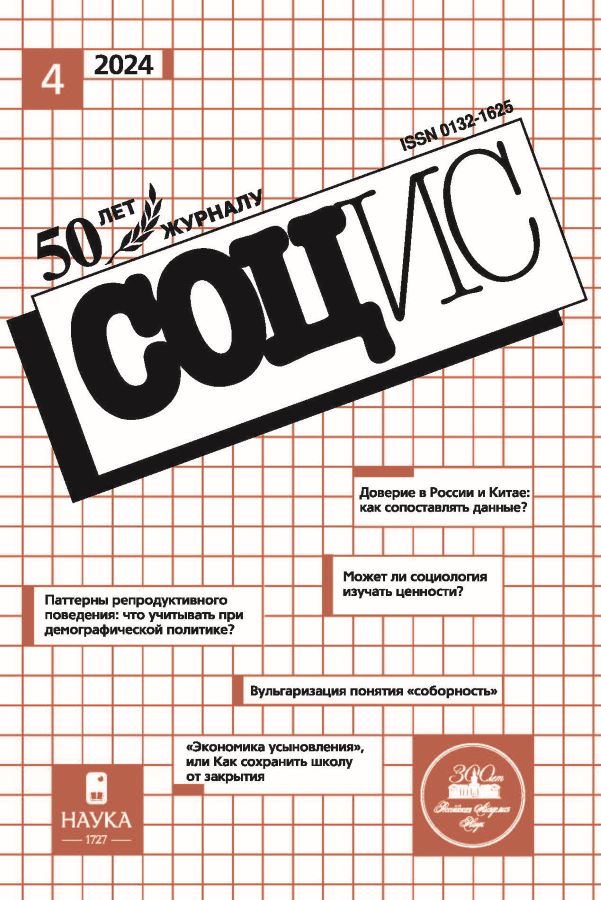Civilizational turn and metatheoretical reconfiguration in contemporary sociology
- Авторлар: Braslavskiy R.G.1
-
Мекемелер:
- Sociological Institute of FCTAS RAS
- Шығарылым: № 4 (2024)
- Беттер: 37-48
- Бөлім: THEORY. METHODOLOGY
- URL: https://ter-arkhiv.ru/0132-1625/article/view/671687
- DOI: https://doi.org/10.31857/S0132162524040042
- ID: 671687
Дәйексөз келтіру
Аннотация
The article offers a reconstruction of contemporary sociological theory, which gives a central position to civilizational analysis. In the late 20th century, attempts to solve the agency-structure problem led to the formation of a new metatheoretical dilemma of “mutual constitution vs. analytical autonomy”, which overshadowed the traditional dilemma of individualism and holism. The constitutivist solution removed the agency/social structure dichotomy in the relational conception of power, while the autonomist solution mediated it by relying on the analytic conception of culture. The civilizational turn brings together these two lines of metatheoretical reconceptualization of sociological problematic, focusing on the relation of culture and power to each other. The model of the relationships between “dimensions” and “spheres” of social life developed within the sociological version of the civilizational approach combines the metatheoretical positions of analytical autonomy and mutual constitution.
Негізгі сөздер
Толық мәтін
Авторлар туралы
Ruslan Braslavskiy
Sociological Institute of FCTAS RAS
Хат алмасуға жауапты Автор.
Email: r.braslavsky@socinst.ru
Cand. Sci. (Sociol.), Deputy Director for Science
Ресей, St. PetersburgӘдебиет тізімі
- Alexander J. C., Smith Ph. (2013) The Strong Program in Cultural Sociology: Elements of a Structural Hermeneutics. In: Alexander J. C. The Meanings of Social Life: A Cultural Sociology. Moscow: Praksis: 56–94. (In Russ.)
- Arnason J. P. (1987) Figurational Sociology as a Counter-Paradigm. Theory, Culture & Society. Vol. 4. No. 2–3: 429–456.
- Arnason J. P. (1989) Civilization, Culture and Power: Reflections on Norbert Elias’ Genealogy of the West. Thesis Eleven. Vol. 24. No. 1: 44–70.
- Arnason J. P. (2001) Civilizational Patterns and Civilizing Processes. International Sociology. Vol. 16. No. 3: 387–405.
- Arnason J. P. (2003) Civilizations in Dispute: Historical Questions and Theoretical Traditions. Leiden; Boston: Brill.
- Arnason J. P. (2010) The Cultural Turn and the Civilizational Approach. European Journal of Social Theory. Vol. 13. No. 1: 67–82.
- Arnason J. P. (2012) Making Sense of Civilizational Dynamics: Introductory Remarks. Zhurnal sociologii i socialnoy antropologii [Journal of Sociology and Social Anthropology]. Vol. 15. No. 6: 18–29. (In Russ.)
- Arnason J. P. (2014) The Religio-political Nexus: Historical and Comparative Reflections. In: Arnason J. P., Karolewski I. P. (eds) Religion and Politics: European and Global Perspectives. Edinburgh: Edinburgh University Press: 8–36.
- Arnason J. P. (2015) Elias and Eisenstadt: The Multiple Meanings of Civilisation. Social Imaginaries. Vol. 1. No. 2: 146–176.
- Arnason J. P. (2017) Revolutions, Transformations, Civilizations: Prolegomena to a Paradigm Reorientation. Neprikosnovennyj zapas. Debaty o politike i culture [Untouchable reserve. Debates on politics and culture]. No. 5: 37–69. (In Russ.)
- Arnason J. P. (2020) The Labyrinth of Modernity: Horizons, Pathways and Mutations. London: Rowman and Littlefield.
- Arnason J. P. (2021) The Cultural Turn and the Civilizational Approach. In: Arnason J. P. Civilizational Patterns and Historical Processes. Moscow: NLO: 84–109. (In Russ.)
- Conrad S. (2018) What is Global History? Moscow: NLO. (In Russ.)
- Eisenstadt S. N. (1987) Macrosociology and Sociological Theory: Some New Directions. Contemporary Socio-logy. Vol. 16. No. 5: 602–609
- Eisenstadt S. N. (2000) The Civilizational Dimension in Sociological Analysis. Thesis Eleven. Vol. 62. No. 1: 1–21.
- Elias N. (1978) What is Sociology? New York: Columbia University Press.
- Elias N. (2001) Society of Individuals. Moscow: Praksis. (In Russ.)
- Giddens A. (2005) The Constitution of Society. Outline of the Theory of Structuration. Moscow: Akadem. proekt. (In Russ.)
- Joas H., Knöbl W. (2011) Social Theory. Twenty Introductory Lectures. St Petersburg: Aletejja. (In Russ.)
- Maslovski M. V. (2012) Johann Arnason’s Civilizational Analysis: The Soviet Model of Modernity. METOD: Moskovskij ezhegodnik trudov iz obshhestvovedcheskih discipline [METHOD: Moscow Yearbook of Works from Social Disciplines]. No. 3: 346–360. (In Russ.)
- Nietzsche F. (2005) The Will to Power. An Attempted Transvaluation of All Values. Moscow: Kulturnaya revolyutsiya. (In Russ.)
- Olick J. K. (2010) What is “The Relative Autonomy of Culture”? In: Hall J. R., Grindstaff L., Lo M.-Ch. (eds) Handbook of Cultural Sociology. London; New York: Routledge: 97–108.
- Olick J. K. (2012) Figurations of Memory: A Process-Relational Methodology Illustrated on the German Case. Sociologicheskoe obozrenie [Russian Sociological Review]. Vol. 11. No. 1: 40–74. (In Russ.)
- Shnirelman V. A. (2011) “The Threshold of Tolerance”: The Ideology and Practice of the New Racism. Vol. I. Moscow: NLO. (In Russ.)
- Smith J. (2017) Debating Civilizations: Interrogating Civilizational Analysis in a Global Age. Manchester: Manchester University Press.
- Šubrt J. (2013) Individualism versus Holism: An Attempt to Overcome Theoretical Dualism. Vestnik RUDN. Ser. Sociologiya [RUDN Journal of Sociology]. 2013. No. 1: 34–64. (In Russ.)
- Titarenko L. (2022) Eastern Asian Modern in the Civilizational Concept of Johann Arnason. Zhurnal sociologii i social’noy antropologii [Journal of Sociology and Social Anthropology]. Vol. 25. No. 2: 80–95. (In Russ.)











